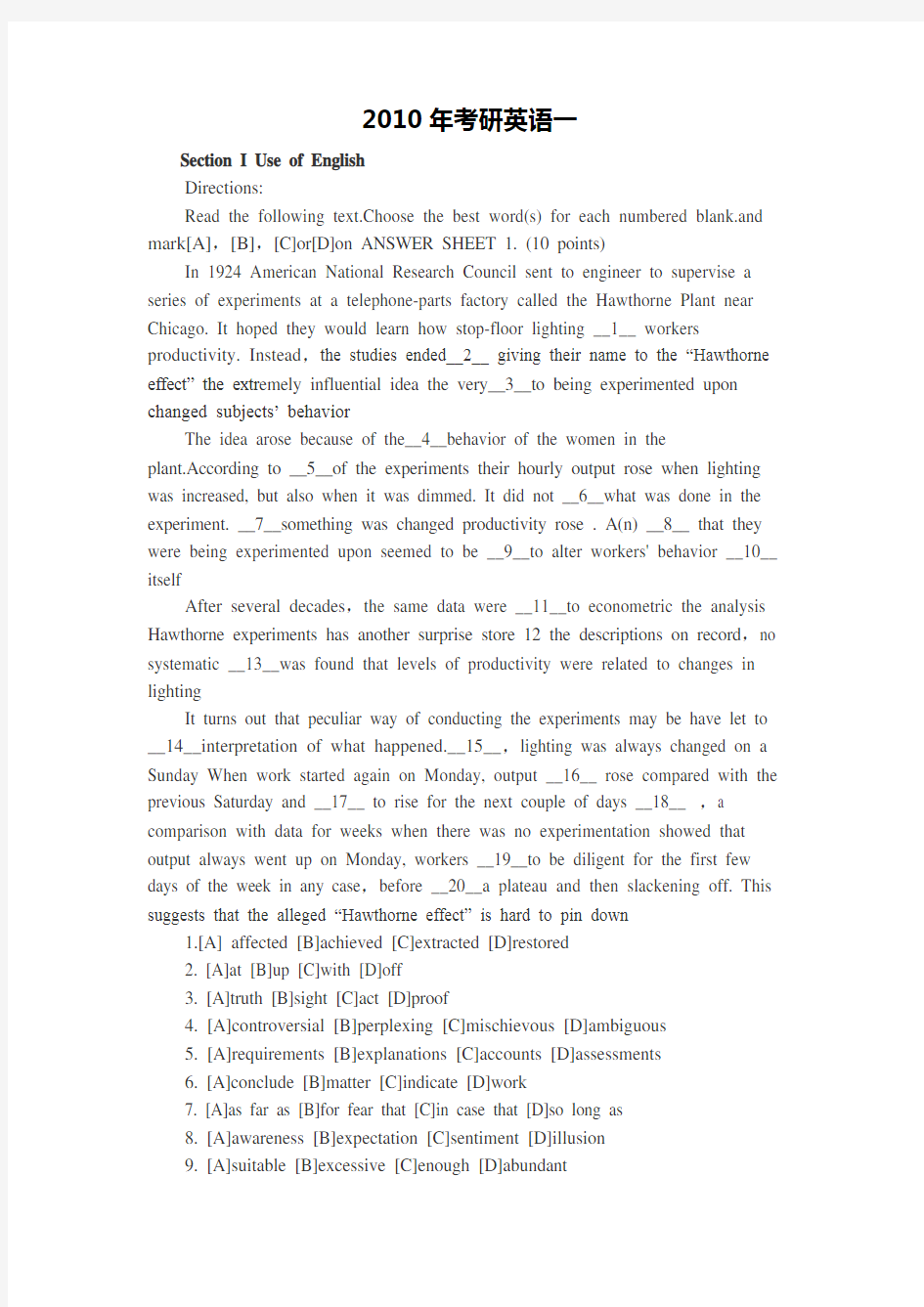2010年考研英语一真题及参考答案解析

- 1、下载文档前请自行甄别文档内容的完整性,平台不提供额外的编辑、内容补充、找答案等附加服务。
- 2、"仅部分预览"的文档,不可在线预览部分如存在完整性等问题,可反馈申请退款(可完整预览的文档不适用该条件!)。
- 3、如文档侵犯您的权益,请联系客服反馈,我们会尽快为您处理(人工客服工作时间:9:00-18:30)。
2010年考研英语一
Section I Use of English
Directions:
Read the following text.Choose the best word(s) for each numbered blank.and mark[A],[B],[C]or[D]on ANSWER SHEET 1. (10 points)
In 1924 American National Research Council sent to engineer to supervise a series of experiments at a telephone-parts factory called the Hawthorne Plant near Chicago. It hoped they would learn how stop-floor lighting __1__ workers productivity. Instead,the studies ended__2__ giving their name to the “Hawthorne effect” the extr emely influential idea the very__3__to being experimented upon changed subjects’ behavior
The idea arose because of the__4__behavior of the women in the
plant.According to __5__of the experiments their hourly output rose when lighting was increased, but also when it was dimmed. It did not __6__what was done in the experiment. __7__something was changed productivity rose . A(n) __8__ that they were being experimented upon seemed to be __9__to alter workers' behavior __10__ itself
After several decades,the same data were __11__to econometric the analysis Hawthorne experiments has another surprise store 12 the descriptions on record,no systematic __13__was found that levels of productivity were related to changes in lighting
It turns out that peculiar way of conducting the experiments may be have let to __14__interpretation of what happened.__15__,lighting was always changed on a Sunday When work started again on Monday, output __16__ rose compared with the previous Saturday and __17__ to rise for the next couple of days __18__ ,a comparison with data for weeks when there was no experimentation showed that output always went up on Monday, workers __19__to be diligent for the first few days of the week in any case,before __20__a plateau and then slackening off. This suggests that the alleged “Hawthorne effect” is hard to pin down
1.[A] affected [B]achieved [C]extracted [D]restored
2. [A]at [B]up [C]with [D]off
3. [A]truth [B]sight [C]act [D]proof
4. [A]controversial [B]perplexing [C]mischievous [D]ambiguous
5. [A]requirements [B]explanations [C]accounts [D]assessments
6. [A]conclude [B]matter [C]indicate [D]work
7. [A]as far as [B]for fear that [C]in case that [D]so long as
8. [A]awareness [B]expectation [C]sentiment [D]illusion
9. [A]suitable [B]excessive [C]enough [D]abundant
10. [A]about [B]for [C]on [D]by
11. [A]compared [B]shown [C]subjected [D]conveyed
12. [A]contrary to [B]consistent with [C]parallel with [D]peculiar to
13.[A]evidence [B]guidance [C]implication [D]source
14.[A]disputable [B]enlightening [C]reliable [D]misleading
15.[A]In contrast [B]For example [C]In consequence [D]As usual
16. [A]duly [B]accidentally [C]unpredictably [D]suddenly
17. [A]failed [B]ceased [C]started [D]continued
20.[A]breaking [B]climbing [C]surpassing [D]hitting
Section Ⅱ Reading Comprehension
Part A
Directions:
Read the following four texts.Answer the questions below each text by choosing[A],[B],[C]or[D].Mark your answers on ANSWER SHEET 1.(40 points) Text 1
Of all the changes that have taken place in English-language newspapers during the past quarter-century, perhaps the most far-reaching has been the inexorable decline in the scope and seriousness of their arts coverage.
It is difficult to the point of impossibility for the average reader under the age of forty to imagine a time when high-quality arts criticism could be found in most
big-city newspapers. Yet a considerable number of the most significant collections of criticism published in the 20th century consisted in large part of newspaper reviews. To read such books today is to marvel at the fact that their learned contents were once deemed suitable for publication in general-circulation dailies.
We are even farther removed from the unfocused newspaper reviews published in England between the turn of the 20th century and the eve of World War II, at a time when newsprint was dirt-cheap and stylish arts criticism was considered an ornament to the publications in which it appeared. In those far-off days, it was taken for granted that the critics of major papers would write in detail and at length about the events they covered. Theirs was a serious business, and even those reviewers who wore their learning lightly, like George Bernard Shaw and Ernest Newman, could be trusted to know what they were about. These men believed in journalism as a calling, and were proud to be published in the daily press. “So few authors have brains enough or literary gift enough to keep their own end up in journalism,” Newman wrote, “that I am tempted t o define ‘journalism’ as ‘a term of contempt applied by writers who are not read to writers who are.’”
Unfortunately, these critics are virtually forgotten. Neville Cardus, who wrote for the Manchester Guardian from 1917 until shortly before his death in 1975, is now
